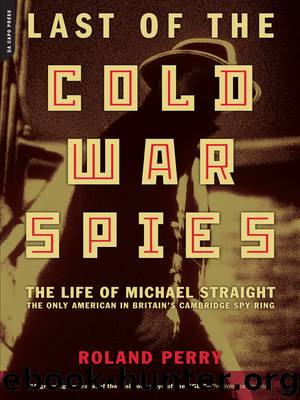Last of the Cold War Spies by Roland Perry

Author:Roland Perry [ROLAND PERRY]
Language: eng
Format: epub
Publisher: Da Capo Press
Published: 2012-01-30T05:00:00+00:00
Straight saved the situation for the moment by insisting that Wallace go ahead with a planned tour of Europe to build his image as a statesman. Straight set up and funded the trip after engineering a “request” for Wallace to visit England by his contacts, including editor Kingsley Martin, at the left-wing New Statesman magazine.
It was a critical time. Truman was pressuring the senate to ratify his plans to fight communism abroad and contain Russia, but many of its members needed persuading. In England the Labour Party was in power and divided over the Truman Doctrine. Its vocal communist faction was creating a fuss over the issue. Several members of the British cabinet were against it and siding with Wallace’s stance. Following the Stalinist line, Straight was ambitious to drive a wedge between the United Kingdom and the United States, and Wallace presented what appeared to be a very good opportunity for doing it. Straight was not fearful of communist support in the United Kingdom, where liberal views often were indistinguishable from hard-left positions. He arranged for more than fifty communist and other left-wing members of parliament to sign a telegram welcoming Wallace. Yet Straight could not cajole Ernest Bevin, Britain’s foreign secretary, into signing his name. Labour, despite its left-wing tilt, could not break with Truman, especially with the Conservative opposition, led by Churchill, unanimously in favor of the president’s policy. There was a fear in the United Kingdom as much as the United States of Stalin’s expansionist aims.
Straight arrived in England on April 7, 1947, and was driven to Dartington, where the family, unaware of the amount of money being lost on The New Republic, welcomed him warmly.10 He had portrayed his support for Wallace to his parents as a gallant fight for peace. And from what they could see on the surface, this was well worth supporting. Dorothy didn’t like Truman or any of his policies and was a strong Wallace supporter. She agreed with Straight’s earnest positions on the United States staying out of foreign lands. Dorothy deplored the concept of the loyalty program and was fearful of how the FBI would use it. The heat of these issues had ensured her support for Straight’s actions with The New Republic, although a proper assessment of the expenditure then may have caused her concern.
The British papers were editorializing on the Truman Doctrine, and Wallace decided he would say something precipitate on the issue when he arrived in England the next day, April 8. It was a contentious approach.11 It was one thing for an ex–vice-president and potential presidential candidate to make remarks at home, but it was another to make them on foreign soil, especially if they related to sensitive policy issues. It would focus further attention on the candidate, which was what a tour like this was all about.
Wallace went from the airport to the Savoy Hotel where Straight had organized a press conference for fifty reporters. The politician had little choice but to respond to demands to know where he stood on the Truman Doctrine.
Download
This site does not store any files on its server. We only index and link to content provided by other sites. Please contact the content providers to delete copyright contents if any and email us, we'll remove relevant links or contents immediately.
Waking Up in Heaven: A True Story of Brokenness, Heaven, and Life Again by McVea Crystal & Tresniowski Alex(37493)
Still Foolin’ ’Em by Billy Crystal(36049)
Cecilia; Or, Memoirs of an Heiress — Volume 1 by Fanny Burney(32067)
Cecilia; Or, Memoirs of an Heiress — Volume 3 by Fanny Burney(31463)
Cecilia; Or, Memoirs of an Heiress — Volume 2 by Fanny Burney(31413)
Fanny Burney by Claire Harman(26247)
Empire of the Sikhs by Patwant Singh(22772)
We're Going to Need More Wine by Gabrielle Union(18640)
Hans Sturm: A Soldier's Odyssey on the Eastern Front by Gordon Williamson(18330)
Plagued by Fire by Paul Hendrickson(17117)
Out of India by Michael Foss(16695)
Cat's cradle by Kurt Vonnegut(14768)
All the Missing Girls by Megan Miranda(14766)
Molly's Game by Molly Bloom(13889)
Pimp by Iceberg Slim(13787)
Bombshells: Glamour Girls of a Lifetime by Sullivan Steve(13691)
Leonardo da Vinci by Walter Isaacson(12809)
4 3 2 1: A Novel by Paul Auster(11800)
The Radium Girls by Kate Moore(11626)
